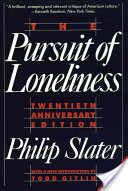 The Story (adapted from In Pursuit of Loneliness by Philip Slater): Once upon a time (don’t all good stories begin this way?), a strong, capable man sought escape from the bustle and din surrounding him. He found refuge deep in a forest that was beautiful and rich with wood, game, water, and fertile soil. It was peaceful. Clean. The smell was fresh and pure. It was perfect. And it was all his to use as he wished.
The Story (adapted from In Pursuit of Loneliness by Philip Slater): Once upon a time (don’t all good stories begin this way?), a strong, capable man sought escape from the bustle and din surrounding him. He found refuge deep in a forest that was beautiful and rich with wood, game, water, and fertile soil. It was peaceful. Clean. The smell was fresh and pure. It was perfect. And it was all his to use as he wished.
Winter proved to be frigid and the trees surrounding the hut made excellent firewood. But without the trees to shade his shelter, the man was under relentless heat when summer arrived. He complained bitterly.
The man started a garden and tended a flock of chickens. Naturally, rabbits were attracted to the garden buffet. The man, priding himself on being a problem-solver went and trapped a fox, then trained his canine companion to keep the rabbits away. When instinct took over and the fox ate the chickens, the man cursed the betrayal of all the woodland creatures.
Space was plentiful so his refuse was strewn about, out of his immediate sight. Because his garbage wasn’t treated properly it soon attracted swarms of rats, mice, and insects, thus infuriating him.
One day, he went to his old village and boasted of his glorious space and abundant game. Word spread and soon people came to see where he lived and take outings near his home. This angered the man who posted signs, built traps, and shot at those who ventured too near.
In revenge, some boys came to play mischief. The man took to sleeping with his gun at night but one evening mistakenly shot his foot. The villagers, feeling bad for his misfortune, stayed away. The man felt slighted against, and felt the villagers had shunned him.
The man was troubled. But he saw all these troubles from coming outside himself to which he had no control. He cursed his situation, his loneliness, his former neighbors, his wretchedly hot summers – none of it was his fault.
Q: What was the man’s name?
A: American.
Say What!?
Slater’s allegory is that of American society. You may find Slater’s perspective rather heavy-handed but you are invited to explore three foundational truths his fable reveals about our society and the way we organize ourselves. And within these truths is the suggestion of a better way. This is the way that Beyond Teal is dedicated to helping you put into practice.
Ready? Here we go:
1) The unbridled pursuit of freedom and independence at the cost of forgetting how to work together is the undoing of a civilized society. The overarching theme here is that individual potential (not to be confused with freedom) is realized at a higher level in the context of working and playing together. A successful society is ultimately not about personal independence but working together.
The natural world has this figured out. While it’s not a law of physics, it is a reality that cannot be changed. Ludwig Von Bertalanffy, the great systems theorist observed, “The whole is greater than the sum of the parts.” Simply put, together we are greater. How do you work best with a sense of wholeness? What do you need in place for this to work for you and others?
2) The speed and the pace of change are accelerating. History reveals all we need to know for this one. If human history read like a book, discoveries in exploration, philosophy, science and technology would be brief, highlighted paragraphs occasionally brightening a few words here and there across thousands of pages of text. Until recently. Our last 100 years, 50 years, even 15 years are choked with inventions that have been put to use in society before we have grasped the long-term ramifications of their brash realities.
Organizational structure is not designed to react at this pace. How do you structure an organizational system to be proactive in evolving instead of consuming resources in reactionary mode caught in a permanent game of catching up? How do you address this phenomenon in your personal life?
3) Society has adopted the “toilet assumption.” The toilet assumption, coined by Slater, is our society’s practice of acting on the belief that if we flush it away, it disappears. This concept plays out environmentally. Landfills hide our garbage. Immense water resources replace that which we’ve fouled. Dirty air gets blown away. The oceans absorb our industrial carbon and methane output. It also plays out socially. We banished Native Americans to reservations, we trap the poor in inner cities and rural outposts, and inequalities are perpetuated but rarely highlighted.
The toilet assumption works…until the system gets backed up and we are face-to-face with our garbage.
Here’s an example (out of thousands) of the toilet assumption applied to business and consumers. Selling disposable water bottles is lucrative. Drinking water is a healthy act but intuitively we know that plastic water bottles are creating a bigger problem than the benefit of having a convenient, disposable object with which to sip your water provides. But our society says the manufacturer is entitled to their right to make this product. And we are entitled to our right to purchase it.
So what gets lost in this transaction?
Flushing a problem away is an act of unbridled freedom that has not been earned with the full acceptance of the responsibilities that go along with freedom.
Are your choices aligned with a sense of entitlement or a sense of providing true, sustainable value to society? How can you grow your connection between what you get and what you put back into society?
There is a positive spin on this too. Take the health insurance, an expensive employer benefit. Now, there are all sorts of reasons why a good employer should provide health insurance but to the employees, the value of that benefit disappears within weeks of starting a job. What might change if the employer lists the value of ancillary benefits on each paystub? How might your outlook change if these benefits were made more visible to you?
A Leadership Riddle
The foundational truths listed are shaped by leadership and followership— your choices, commitments, and actions.
"The role of leadership is to get in touch with reality because reality always wins.” – J.S.P. Murray.
Murray’s quote is statement of truth and conundrum. What is your full potential and its contribution to society? Because that’s the reality that will be your legacy.
Are you committed to finding your answers? Let’s work together to make reality one that is worth living. Your guide is here. Come join the conversation.
Beyond Teal Special Event Coming December 1, 2016 Check out the lineup of speakers!
Bruce Peters has spent the last 15 years living his own “Third Act.” Based on his personal experience and in working as a guide for hundreds of leaders, he has designed a unique process for getting beyond where you are and into the creation of your own Third Act for you and your organization’s version of Teal. It starts with the question of what is the difference you want to make? Learn more at www.beyondteal.com.


